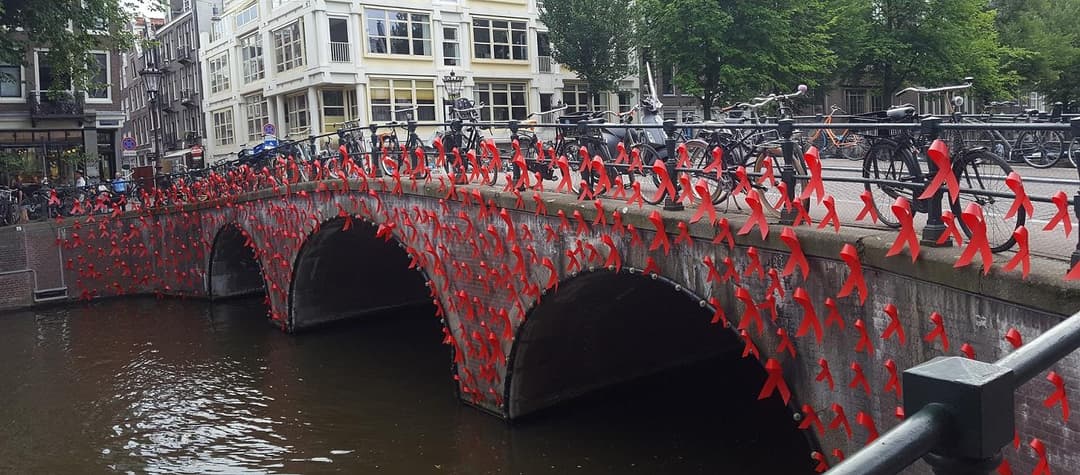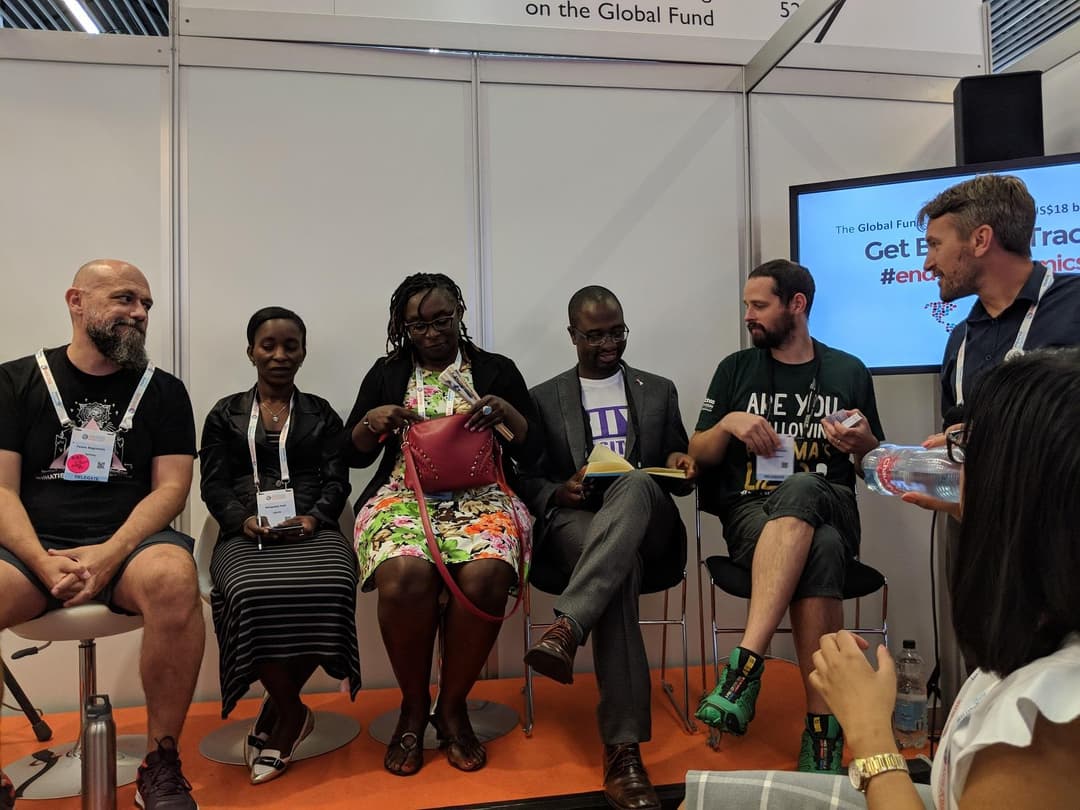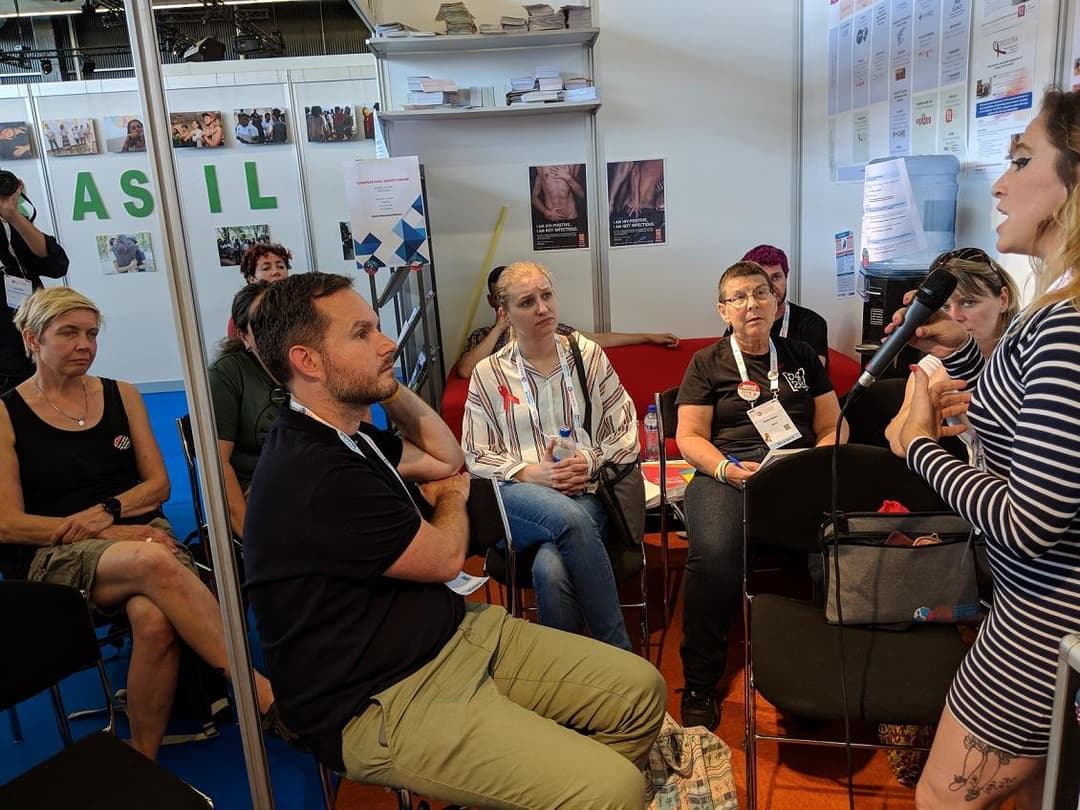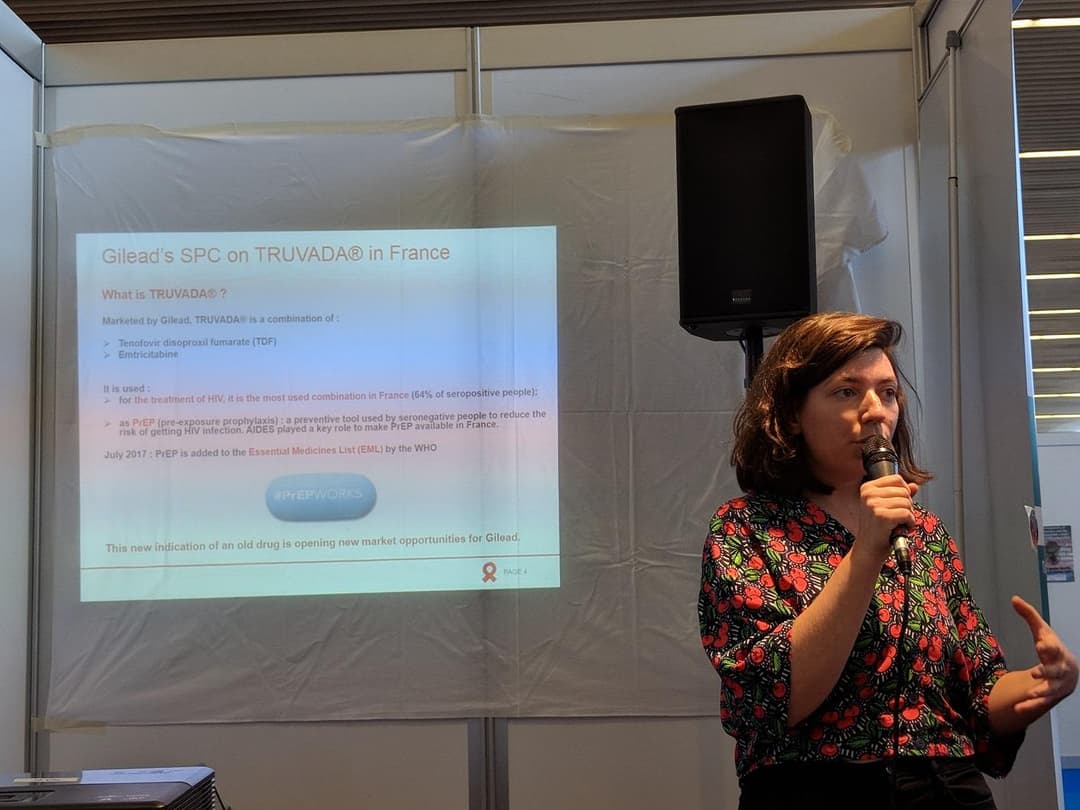AIDS Action Europe’s executive office attended the 22nd International AIDS Conference, which has been a big success for many of us addressing gaps and challenges in Eastern Europe and Central Asia (EECA) region, which remains as one of the few regions in the world where new HIV cases and AIDS deaths continue to grow rapidly. However, 16.000 people from 160 countries came to Amsterdam for the conference to break barriers and build bridges.
AAE in the Global Village
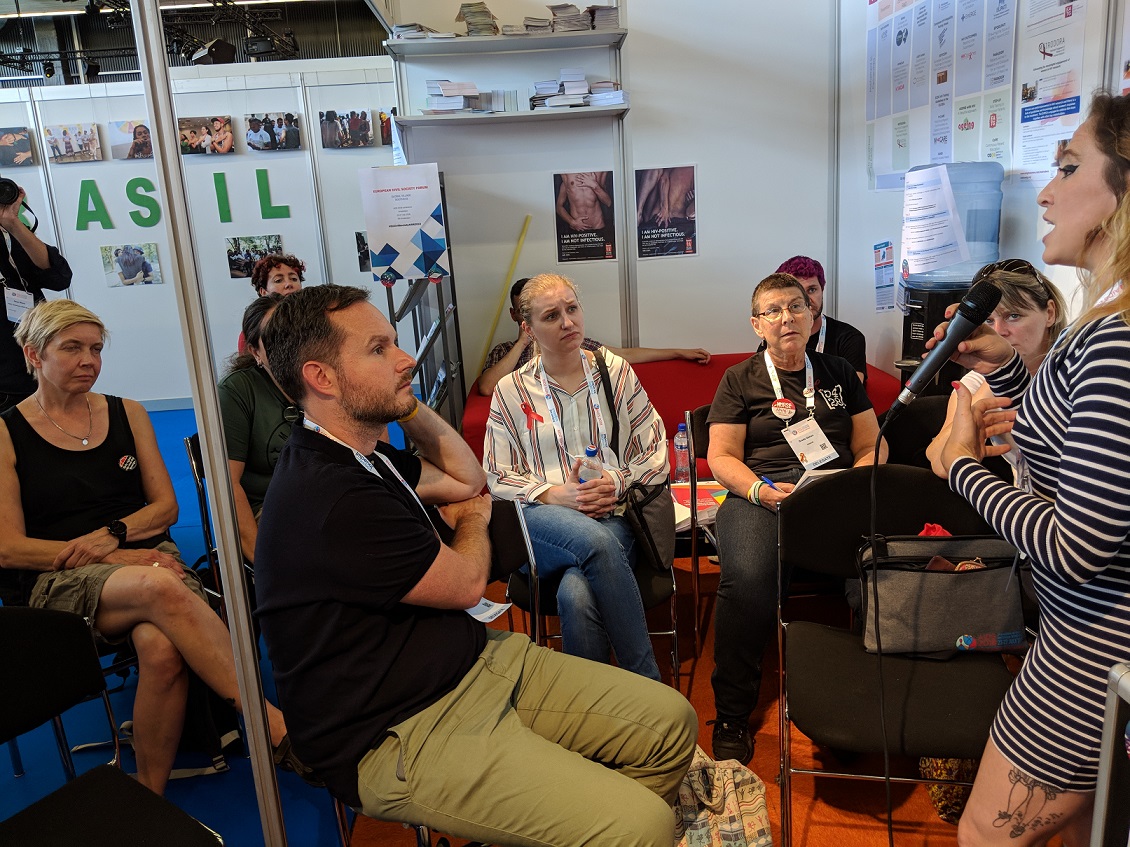
The Global Village, dedicated to people who work on the ground at the community level, for activists and other civil society representatives. Here they presented their work and implemented podium discussions and presentations on harm reduction, HIV/AIDS prevention, and so on. AAE, together with the European AIDS Treatment Group, have co-organised the European Civil Society Forum booth 618 in the Global Village. Our aim was to give our partners and members the opportunity to connect and exchange their work. The programme consisted of key speeches by representatives of the European Commission, the WHO, NGO Delegates to the UNAIDS PCB and key stakeholders from NGOs and communities to present their good practice examples of collaboration with GOs.
Reaching the 90-90-90 targets and ending AIDS by 2030 in the SDG era
AIDS Action Europe was invited to speak during a symposium focusing on EU´s progress towards the HIV-related targets. The symposium was co-organised by UNAIDS and DG Santé of the European Commission. Our colleague, Ferenc Bagyinszky, addressed the issue of Central and Southeast European countries where the epidemics among gay men and other MSM are constantly rising with a 300% increase in the last 10 years, although the figures disappear in the total numbers when it come to the European Union´s progress. Read more about the session here.
Ljubljana Declaration 2.0
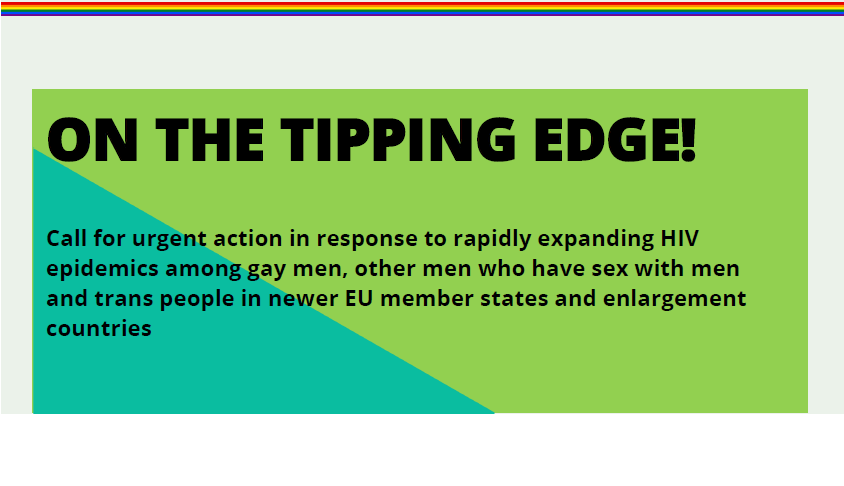 During the conference, AIDS Action Europe with its partner organisations and networks, launched the Ljubljana Declaration 2.0, an urgent call for action to address the issue of the epidemics among gay men and other MSM in the new(er) EU Member States and candidate countries. Read and endorse the full declaration here.
During the conference, AIDS Action Europe with its partner organisations and networks, launched the Ljubljana Declaration 2.0, an urgent call for action to address the issue of the epidemics among gay men and other MSM in the new(er) EU Member States and candidate countries. Read and endorse the full declaration here.
NGO Delegation to the UNAIDS PCB
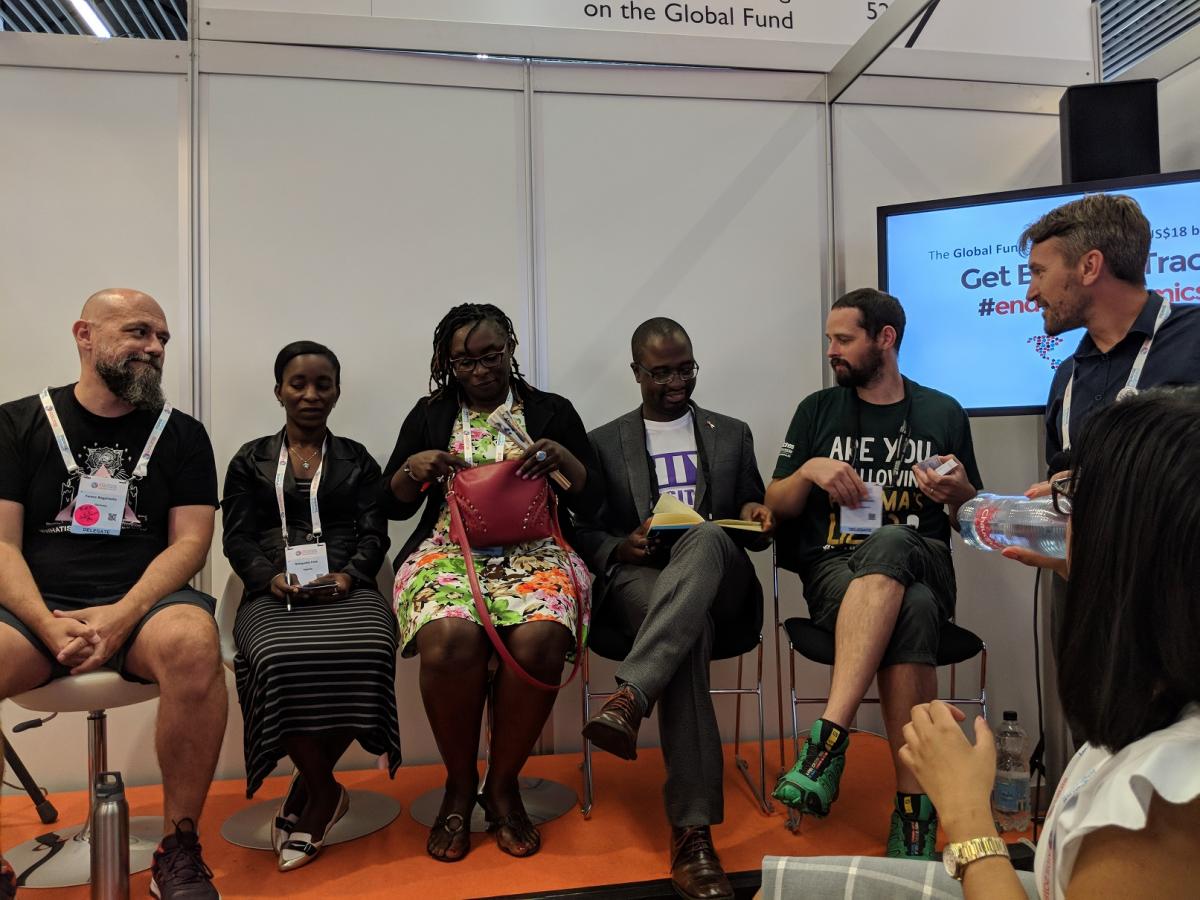 AAE holds a seat on the NGO Delegation to the UNAIDS Programme Coordinating Board. The Delegation organised and participated in several sessions where civil society and community representatives could discuss priorities in their national and regional HIV responses and how these could be integrated into the global agenda. The Delegation also participated in a session with other civil society representatives of delegations to the Global Fund or UNITAID discussing joint challenges and priorities, discussing how they can improve communication and collaboration between the different delegations.
AAE holds a seat on the NGO Delegation to the UNAIDS Programme Coordinating Board. The Delegation organised and participated in several sessions where civil society and community representatives could discuss priorities in their national and regional HIV responses and how these could be integrated into the global agenda. The Delegation also participated in a session with other civil society representatives of delegations to the Global Fund or UNITAID discussing joint challenges and priorities, discussing how they can improve communication and collaboration between the different delegations.
“Chase the virus, not people!”
Just before the conference, a powerful campaign started to stress out the impact of repressive, discriminatory laws and practices of their application, as well as stigma against key populations and people living with HIV. A group of EECA regional community networks joined forces to “Chase the virus, not people!” and to achieve obligations to create an enabling legal environment and to involve key populations and people living with HIV in decision-making processes. The campaign aimed at the common needs of all key populations and focuses on achieving the goals in general and for each community in particular. They were visible all over the conference by wearing handcuffs as a symbol of limited freedom and actions and by protests and interventions against the war on drugs.
U=U and PrEP works
A remarkable breakthrough was the U=U and PrEP pre-conference. Due to PARTNER2 study, which proofed 783 gay couples with one partner living with HIV and on treatment and more than 77.000 times having sex without condoms, that there were zero phylogenetically-linked HIV transmissions. The results show that the risk of HIV transmission when HIV viral load is suppressed is effectively zero. Occasionally the ANRD Prevenir study proved with 1.594 participants (98,9% MSM) who are taking PrEP daily and on-demand, that to date HIV transmission in both, daily and on-demand, has been zero. Now, the proof on TasP and PrEP is evidence-based and waterproofed. This is a breakthrough and can and will be used as evidence to promote TasP and PrEP in many countries. Therefore, the next step is to get easier and free access to treatment for all as same as for affected and stigmatised populations such as trans people and sex workers.
No AIDS2020 in Trumps America
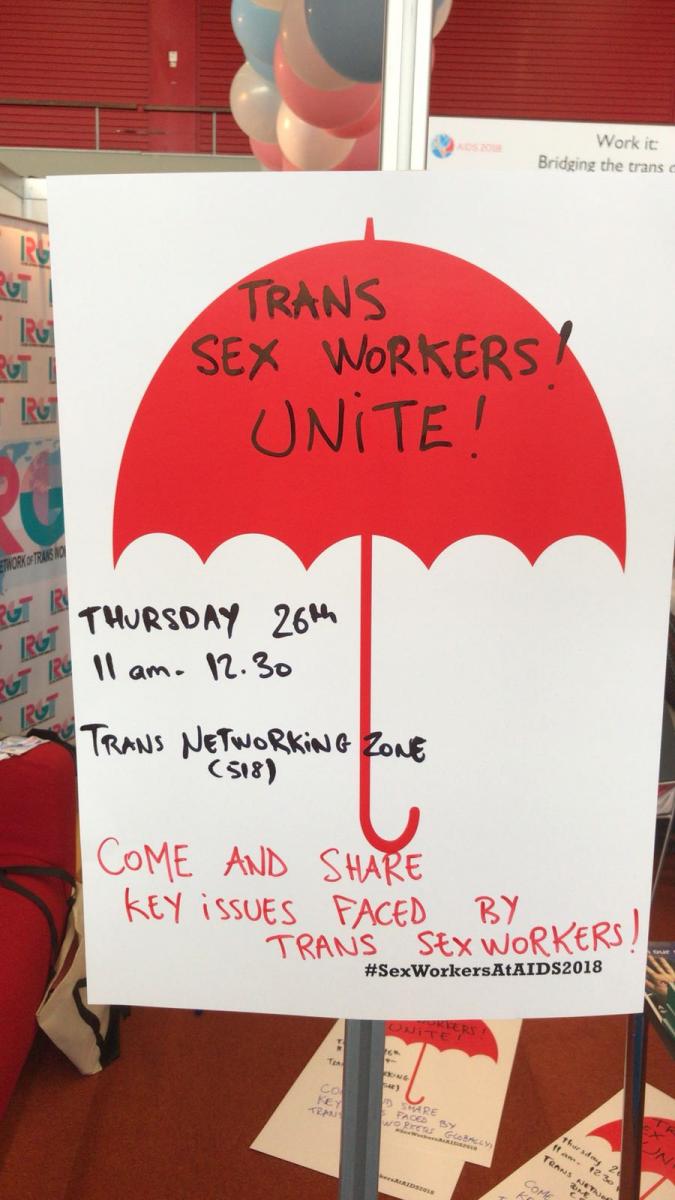
This leads to the protests by the sex workers community during the conference. They called upon the IAS to announce their decision to relocate the next AIDS 2020 conference immediately. Long-standing biases and human rights violations against people of colour, immigrants, LGBTQ and other populations are rapidly escalating, multifaceted and pernicious in the todays United States. Explicit entry bans preclude participation of current and former sex workers, people who use drugs, Muslims and other key populations.
#HIVPowerShift #AIDS2020ForAll
Human rights + Science = HIV Justice
Twenty world’s leading HIV scientists launched an expert consensus statement on the science of HIV in the context of criminal law during the conference. It proved that up‐to‐date scientific evidence in criminal cases has the potential to limit unjust prosecutions and convictions. It recommends that caution be exercised when considering prosecution, and encourage governments and those working in legal and judicial systems to pay close attention to the significant advances in HIV science that have occurred over the last three decades to ensure current scientific knowledge informs application of the law in cases related to HIV.
Sexual Health Cascade
David Malebranche from United States, a medicine physician, a professor of medicine, an expert in men’s and LGBT health and a researcher of sexual health among black men of diverse sexualities, David held a moving speech on the discrimination of PLHIV in health care settings. Moreover he appealed on fighting the HIV stigma in medical clinics, he pointed out the fear of discrimination among MSMs in health care settings and challenges with confidence with MSM sexual health counselling in many countries. His response is the Sexual Health Cascade, based on pillars of the 90-90-90 UNAIDS targets, he says to promote a positive sexual identity, with linkage to family, friends and community, to improve engaging with each other and to live a health sexual life. Saying with princess Shuri’s words, “just because something works doesn’t mean it can’t be improved”.
Needs of young PLHIV
This year’s conference lit up the youngsters. Young people who live with HIV and young people who use drugs are stigmatised in many of their respective countries. Yana Panfilova, the head of the board of Teenergizer in Ukraine, a union of adolescents and youth in Ukraine, outlined that the needs of young people are essential in the elimination of HIV epidemic and HIV prevention. Yana was born with HIV and learned early about her status. She pointed out that the needs of young people are mostly not met in guidelines or policies. She appeals for a better inclusion of young people needs into the HIV/AIDS prevention and care.

